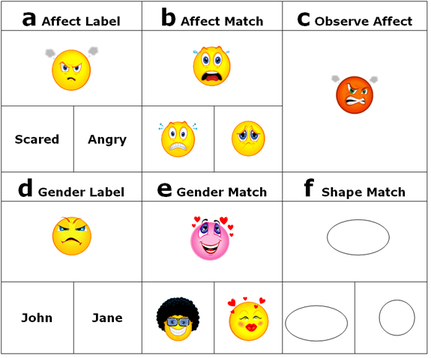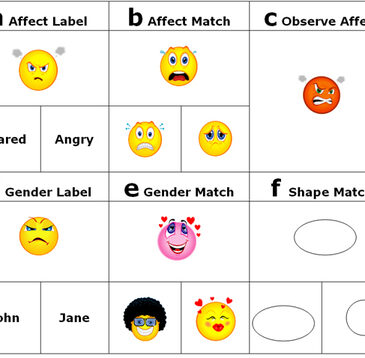There are various forms of therapy, but for many people help revolves around talking over past experiences. Researchers are working to uncover the mechanisms by which talk therapy operates. Recently, Lieberman et al. (2007) utilized functional Magnetic Resonance Imaging (fMRI), to examine how affect labeling (i.e., putting feelings to words) diminishes activity in areas of the brain associated with emotional response.
Thirty subjects completed 10 trials each of 6 experimental tasks: (a) labeling emotional facial expressions; (b) matching emotional facial expressions; (c) observing emotional facial expressions; (d) labeling the gender of facial images; (e) matching the gender of facial images; and (f) matching shapes (see Figure). Researchers used fMRI to scan participants’ brains as they completed each of the tasks. The authors suggested that if affect labeling diminishes emotional reactivity to negative stimuli, the fMRI should reveal reduced activity in the amygdala.

Figure. A display of the 6 types of stimuli used in the experiment. Click image to enlarge.
Engaging in affect labeling, the combination of observing an emotional stimulus and labeling the emotion (i.e., stimulus a), significantly reduced amygdala activity compared to the separate tasks of observing without labeling (stimulus c) or labeling a non-emotional stimulus (stimulus d). Additional analyses revealed a plausible neural mechanism, showing that activity in the right ventrolateral prefrontal cortex (RVLPFC), mediated by the medial prefrontal cortex (MPFC), might have dampened the amygdala activity.
This study illustrates the dampening effect that affect labeling has on affective activity in the limbic system. The study also provides some early insight into one aspect of how talk therapy might act on the brain to help decrease emotional distress. Future studies could benefit from observing the effect on the amygdala and the larger limbic system produced by having people experience and verbalize their reaction to negative emotional images. It also might be helpful to observe activity in the limbic system while participants undergo psychotherapy to see what effect therapy has on the limbic system. Evaluating treatment is an important part of the process. Advances in technology might contribute to a better understanding of the effectiveness of various forms of treatment for those suffering from mental illness.
—John Kleschinsky
What do you think? Please use the comment link below to provide feedback on this article.
References
Gerrig, R. J. Z., Philip G. (2002). Psychology and life (16th ed.). Boston: Allyn and Bacon.
Lieberman, M. D., Eisenberger, Naomi I., Crockett, Molly J., Tom, Sabrina M., Pfeifer, Jennifer H., Way, Baldwin M. (2007). Putting feelings into words: Affect labeling disrupts amygdala activity in response to affective stimuli. Psychological Science, 18(5), 421-427.




